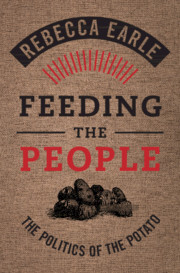Book contents
- Feeding the People
- Feeding the People
- Copyright page
- Dedication
- Contents
- Figures
- Recipes
- Abbreviations
- Introduction Pouring Ourselves a Large Gin
- Chapter 1 Immigrant Potatoes
- Chapter 2 Enlightened Potatoes
- Chapter 3 Free-Market Potatoes
- Chapter 4 Global Potatoes
- Chapter 5 Capitalist Potatoes
- Chapter 6 Security Potatoes
- Conclusions Parmentier, Peasants and Personal Responsibility
- Acknowledgements
- Notes
- Bibliography
- Index
Conclusions - Parmentier, Peasants and Personal Responsibility
Published online by Cambridge University Press: 25 June 2020
- Feeding the People
- Feeding the People
- Copyright page
- Dedication
- Contents
- Figures
- Recipes
- Abbreviations
- Introduction Pouring Ourselves a Large Gin
- Chapter 1 Immigrant Potatoes
- Chapter 2 Enlightened Potatoes
- Chapter 3 Free-Market Potatoes
- Chapter 4 Global Potatoes
- Chapter 5 Capitalist Potatoes
- Chapter 6 Security Potatoes
- Conclusions Parmentier, Peasants and Personal Responsibility
- Acknowledgements
- Notes
- Bibliography
- Index
Summary
Events, including the encouragement to eat potatoes, are best understood when they are seen as part of larger sets of ideas, rather than as singularities. The pan-European potato vogue reflected the new political importance that eating acquired during the Enlightenment, as politicians and philosophers began to link individual diets to the strength and wealth of nations. They framed this debate within a language of choice and the individual pursuit of happiness. The connections between everyday life, individualism and the state forged in the late eighteenth century, of which the history of the potato’s emergence as an Enlightenment super-food forms a part, continue to shape today’s debates about how to balance personal dietary freedom with the health of the body politic. The potato’s history also reminds us not to overlook the contributions of small-scale agriculture to the larger history of innovation and change. Recognising peasant contributions to the history of the potato is not simply a matter of historical justice. It is also relevant for our future. Biodiversity is today identified as an essential component of both long-term environmental sustainability and global food security.
Keywords
- Type
- Chapter
- Information
- Feeding the PeopleThe Politics of the Potato, pp. 202 - 212Publisher: Cambridge University PressPrint publication year: 2020



